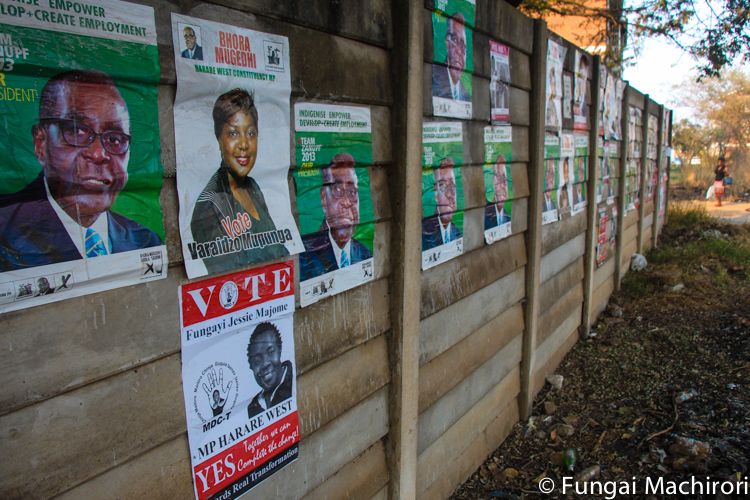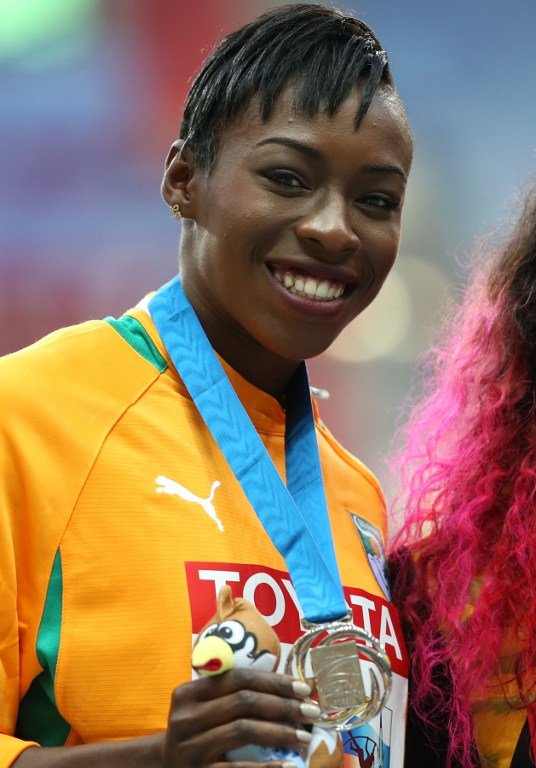The African National Congress stalwart speaks candidly about her book, regrets for putting South Africa before her family, and her fear that history will repeat itself.
‘Life goes on’ for women in Mugabe-led Zimbabwe
Everyday Tendai Phiri* (32) wakes up early to set up her cardboard stall along one of Mabelreign suburb’s main roads where she sells airtime, biscuits, cigarettes and savoury snacks to passing motorists and pedestrians.
Beside her makeshift stand, she unwraps the swathing she uses to bind her nine-month-old daughter to her back. She then lays a sheet of canvas onto the ground before carefully placing her baby onto it. Wrapping the child in thick fleece blankets, Phiri attempts to cushion her from the remnants of a winter cold laced with uncertainty about Zimbabwe’s future.
With more than a week having passed since the announcement of Zimbabwe’s election results, reality is now sinking in for Phiri and many other Zimbabweans: another guaranteed term of office for 89-year-old President Robert Mugabe. While Phiri won’t say which party or presidential candidate she supported or voted for, her general fears of a return to economic mayhem point to dissatisfaction with the outcome of the polls.
“The things we lived through all those years back are just painful to remember,” she states softly. “We have already been through too much.”
Harare West, the constituency in which Phiri lives and voted, was an electoral anomaly for many reasons. It was one of the few that fielded two female candidates from the main contesting parties of Zanu-PF and MDC-T; one of the few in which a female candidate – Fungayi Jessie Majome – won a contested seat; one in which the MDC won one of its 49 seats in Parliament, and also a constituency with one of the youngest parliamentary candidates, 25-year-old Varaidzo Mupunga, representing Zanu-PF.

With Zanu-PF having amassed a majority of more than two thirds within the incoming Parliament, the party has gained the authority to make amendments to the new Constitution that Zimbabweans voted into power in March this year.
“It’s most unlikely that the Zanu-PF party will use its two thirds majority to enhance women’s rights by, for example, inserting a proviso to the effect that the quota for women’s seats should only fall way when gender parity will have been attained in the seats that are up for contestation,” said Majome who also served as deputy minister of Women’s Affairs, Gender and Community Development in government’s previous term.
Quotas for female parliamentarians are one of the gendered reforms within Zimbabwe’s new Constitution that were promoted by the women’s lobby prior to the constitutional vote. Sixty seats – distributed via proportional representation based on votes won by parties within Zimbabwe’s 10 provinces – have been allocated to female politicians for the life of Zimbabwe’s next two Parliaments.
Another key reform put forward in the new Constitution is the establishment of the Zimbabwe Gender Commission to investigate and secure redress for gender-related rights violations. Also, the new Constitution dismantles a patriarchal legality that previously made it impossible for a woman to apply for a birth certificate and/or passport for her child without the consent of the child’s father.

In the run-up to the presidential elections, Zanu-PF attempted to appeal to the female electorate by highlighting the sexual misadventures of main opposition candidate, Morgan Tsvangirai, through an advertisement broadcast on national television. In it, a woman recounts her story of being dumped via SMS by the former prime minister who is referred to as “a bad example” with “a lack of decency”.
But Mugabe himself has not recently endeared himself to women.
Last year at the official announcement of Zimbabwe’s census results, the president attracted critical commentary for blaming women for the nation’s slowing population growth rate. In his speech, he asked why women had been given wombs if they were not utilising them and implored them to give the nation more children. In the run-up to the elections, Mugabe again drew large criticism internationally for referring to SADC’s facilitation team spokesperson, Lindiwe Zulu, as a “stupid” and “idiotic” “street woman” for raising concerns about Zimbabwe’s readiness for elections on July 31, a date only confirmed weeks before the polls.
But discussions such as these still speak little to the immediate needs of women like Phiri.
To earn a profit on her bulk airtime purchases, she needs to sell at least US$92 worth of stocks daily. For now she is making, at best, US$50 a day. With her limited mobility – owing to the baby she has to bring to work and tend to – she is not as vigorous in selling as some of her male peers who often venture into the middle of the road to entice drivers to buy their wares. And so Phiri is now looking for a job as a maid.
Like Phiri, Angela Dhewa (28), a sales consultant with a local manufacturing company, is more concerned about the decisions she has to make about her immediate future.
“Does the fact that I can get a birth certificate for my child without my partner protect me from dying in a labour ward with no electricity, water, medication and birth attendants?” asks Dhewa who has no children and is considering the prospect of leaving the country for fear of what may follow. “If those sorts of matters are not first taken care of, there will be no child for me to register, whether or not I have a partner.”
A poster of Tsvangirai, still clings to the broad-necked tree that Phiri sits under for shade at lunchtime. Some sections of the glossy paper with Tsvangirai’s face have peeled away from the hold of the plastic tape and are tattering away on the same wind that seems to have blown all hope of his assuming leadership of the nation.
I make this observation to Phiri.
“What can we do?” she asks rhetorically. “Life goes on.”
*not her real name
Fungai Machirori is a blogger, editor, poet and researcher. She runs Zimbabwe’s first web-based platform for women, Her Zimbabwe, and is an advocate for using social media for consciousness-building among Zimbabweans. Connect with her on Twitter.
‘Female Drogba’ aims to inspire African athletes
Côte d’Ivoire’s Murielle Ahoure made history on Monday by becoming the first female African sprinter to win a medal in the history of the World Athletics Championships in the 100 metres.
The 25-year-old – the daughter of General Mathias Doue a former chief of staff of the Ivorian army until he was sacked in 2004 by ex-president Laurent Gbagbo – is keen to add another chapter of history by becoming the first African woman to win a medal in the 200m.
Those heats begin on Thursday with the final on Friday.
Ahoure, who reached both the 100m and 200m finals at last year’s Olympics, showed in relegating defending world champion Carmelita Jeter into third in the 100m that she has the mental strength to cope with the major finals.
Even before the final, her status back in Côte d’Ivoire was assuming huge proportions, rivalling that of the national football team and their iconic striker Didier Drogba.
“Am I as well known as the national football team? Yes I am. They (the people) call me the ‘female Drogba’ in terms of being a sporting star… not much pressure there then!” laughed the engaging law graduate.
“When I won world indoor silver in Istanbul last year I returned to Côte d’Ivoire and I couldn’t believe my eyes as there was a huge crowd to greet me at the airport. It was crazy!”

Ahoure has remained very much an Ivorian despite a bohemian lifestyle from an early age which saw her sent to France aged three and then on to the United States where she was educated.
One of her ambitions is to be a role model to other African athletes and stop them from moving abroad and accepting payment to change nationality and run for other countries.
“This medal was for [Côte d’Ivoire], no other country,” said Ahoure.
“I think it is sad so many African athletes feel it is necessary to move abroad and run for other countries.
“At the same time I understand as they have to make a living and an athlete’s life is a precarious one, one lives with the ever present fear of injury which can end your career.”
While Ahoure is grateful to the United States for having provided her with an education and with her future career assured as a lawyer, she said she wants her exploits on the track to persuade other Africans to follow her example.
“I hope that I can serve to be an inspiration to other African athletes and inspire other young Africans to take up athletics.
“The pride I feel when I put on the national team vest is huge and I repay their faith in me by putting [Côte d’Ivoire] on the athletics map. This too could be the reward for other African athletes.”
Pirate Irwin for AFP.
Senior citizens? No, senior students
At 5pm every day, the streets of Nairobi are flooded with people spilling out of their offices and queuing at the nearest bus depot to catch their buses and matatus home. Joyce is one of them but she’s not rushing to get home in time for her favorite soapie or a glass of wine. She’s rushing to get to class. Joyce is a part time MBA student. Big deal, you think? Well, it sort of is.
A mother of three adult children, 56-year-old Joyce is four years away from retirement. She is employed as a secretary at a government ministry in Kenya. When she started working thirty years ago, her certificate in Secretarial Studies from the Polytechnic of Kenya was enough to get her a job and enable her to house, clothe and feed her children. But, as it happens, times changed, and Joyce had to change as well. A certificate will not get you very far in Kenya today, and anything less than a university degree is not considered a worthwhile qualification. At her age, Joyce is not trying to get a promotion – the time for that has passed. She’s trying to learn as much as she can now, to prepare for her retirement. Joyce, who is also a part-time farmer, always loved business. At the age of 50 she decided to enrol for a Bachelor of Business Administration (BBA) degree. She studied, farmed and worked part time, and five years later she graduated with her BBA degree. Why stop now, she thought. In 2012, Joyce enrolled in an MBA program at Kenyatta University.
“I don’t want my life to stop when I retire, I want it to start,” Joyce says. She had to take a loan out to cover her tuition fees but she is confident that her time and effort will pay off once she is a full-time, successful farmer.

Her choice to continue studying may be unusual but she’s not alone. Thousands of older Kenyans are enrolled in part-time undergraduate and post-graduate programs, all of them wanting to make their dreams of a tertiary education finally come true. Take Juliet for example. By day, Juliet is a nursery school teacher, rhyming out ABCs to restless four-year-olds, but by night and weekend, Juliet is a Psychology of Childhood Development student at a college in Nairobi. There is also Claire, a corner kiosk owner. She runs her business fulltime but takes accounting courses over the weekend.
All the women I have met and spoken with are not just students. They are mothers, grandmothers, wives and caretakers and their student status does not exempt them from their other traditional domestic duties. Culture is still largely unforgiving to the Kenyan woman that doesn’t cook, clean and keep an organised household. By any standards, these women have at least three jobs, but for them, their student status is one they wear with pride because it is a choice they made for themselves.
From as early as I can remember, I was taught that a good education was what would make all my dreams come true. My parents often told me to get better grades or suffer a beating. At some point during my pimple-popping teens and great depression over my nonexistent hips, my mother told me quite bluntly that my looks would get me nowhere in this life, but my brain would get me everywhere. The power of the book is preached fervently to all children in Kenya, and academic competition is as bloodthirsty as a boxing match. I always just knew that after high school I was going to a university and that I was going to get a degree. This was never something I questioned, as far as I knew it was a fact.
This was not the case for our mothers and fathers. In their time, tertiary education was for the extremely bright and well-to-do. Only so many people could get scholarships, and at that time, only a select few had degrees. Now that tertiary education is no longer a luxury but a necessity, our parents’ generation is taking every opportunity available to obtain those degrees that were been denied to them so many years ago.
I’m fortunate to be doing what I always wanted to do: write. I doubt that Joyce wanted to be a secretary, or Juliet a nursery school teacher. But luckily for them, they have a second chance to do what they have always dreamed of doing. Despite the challenges – time, money, late nights – sitting in that lecture hall and feeling that your life’s purpose is finally coming to fruition is the price Joyce, Juliet and Claire are willing to pay.
Sheena Gimase is a Kenyan-born and Africa-raised critical feminist writer, blogger, researcher and thought provocateur. She’s lived and loved in Kenya, Tanzania, Zimbabwe, Zambia, South Africa, Botswana and Namibia. Sheena strongly believes in the power of the written word to transform people, cultures and communities. Read her blog and connect with her on Twitter.
Tackling mycetoma: A medical success story in Sudan
Behind the brick walls of the Mycetoma Research Centre trying to unravel the mysteries of the infection is a rare story of medical success in impoverished Sudan.
With bandages on their swollen, deformed feet, patients from across the vast country arrive at the spotless facility set in a garden in the southern Khartoum district of Soba.
For more than 40 years, British-educated researcher Elsheikh Mahgoub has been searching for answers to the mysteries of mycetoma, a bacterial and fungal infection which can spread throughout the body resulting in gross deformity and even death.
Sudan is particularly affected by mycetoma, which is also endemic in a geographic belt including regional neighbours Chad, Niger, Nigeria, Ethiopia, Somalia, parts of Saudi Arabia and Yemen, experts say.
The belt also stretches to India and parts of Latin America.
Mycetoma is “a badly neglected disease”, the United Nations’ World Health Organisation (WHO) says on its website.
Yet in Sudan, researchers have been studying the condition since British colonial times, and the Khartoum centre has been globally recognised for its work.
Such acknowledgement in the health field is unusual for a country which ranks near the bottom of a UN human development index measuring income, health and education.
Mycetoma is characterised by swelling of the feet but it can eat away bone and spread throughout the body, causing grotesque barnacle-like growths, club-like hands and bulging eyes.
The traditional treatment was amputation – something the Sudanese centre tries to avoid.

“Most patients who get it are farmers, or animal herders, and these are poor people,” says Mahgoub (78).
“They are poor, and they get poorer.”
Mahgoub says he established Sudan’s first mycetoma centre in 1968, working with a British nurse and a British technician.
“Many people thought: Why should I be concerned about this disease which is not common, which is difficult to diagnose, and difficult to treat?” he told reporters on a tour of the facility, which opened at its current location in the 1990s.
The centre offers diagnosis, treatment, training and research as part of Soba University Hospital under the University of Khartoum, which funds it along with some donors.
It has its own laboratory, two wards, and is served by seven part-time doctors as well as Mahgoub, the research supervisor, and its director A.H. Fahal, a professor of surgery.
Though its resources are limited, they have been used effectively, Fahal has written.
Patients come and go – with 6 400 registered so far – but Fahal remains and so does Mahgoub, challenged by the puzzle of why mycetoma is so prevalent in Sudan and neighbouring countries.
“I think there’s two things,” Mahgoub explains, pointing first to the organism’s presence in soil.
He says people who make their living from the land are more likely to get pricked by thorns, for example, from the Acacia trees which are widespread in the mycetoma-prone region and provide a route for infection.
Secondly, the patients have been found with weakened immune systems. Some not only have mycetoma but also Aids, leprosy, tuberculosis or other conditions, Mahgoub says.
“Why? Why these people? Is it nutritional, because of malnutrition? Is it because of the other diseases they get at the same time?”
He does not yet have the answers.
“But we know that they have got some deficiency in their cell-mediated immunity.”
Thorn jab 20 years ago
Mohammed al-Amien Ahmad is a typical case.
The farmer tells Mahgoub that a thorn jabbed him about 20 years ago.
“This thorn came out and it seemed to be OK. Later on the swelling came up. It was a bit itchy,” says the goateed farmer, who is in his 60s and wears a traditional white jalabiya robe.
Ahmad, his enlarged left foot oozing pus, has travelled more than 500 kilometres by bus from Umm Rawaba where he farms about 70 acres of sorghum.
His condition worsened over the past two years, he says, forcing him to reduce the amount of land he can work, and cutting into his annual income of 30 000 – 40 000 Sudanese pounds ($4 300 – $5 700).
In a majority of cases mycetoma is painless, meaning patients like Ahmad delay seeking medical care.
This makes treatment more difficult, Mahgoub says.
“The main thing we tell them is to come early… Because if the swelling is small it can be excised in total,” with follow-up medication, he says.

The Mycetoma Research Centre provides diagnosis and any surgery patients may need for free. But patients may require months of anti-fungal medication, which they must buy themselves.
Some who cannot bear the financial burden stop taking their medicine, Mahgoub says.
“In that case the disease will just go back to where it started. That’s a real problem,” he says.
Drug prices in Sudan have climbed over the past two years as Sudan’s currency plunged in value and inflation soared.
Sudan’s health ministry has expressed concern about the emigration of doctors and other health professionals seeking better salaries and working conditions abroad.
Nationwide, there were 1.3 health workers per 1 000 people in 2011, against the WHO benchmark of 2.3.
Many primary health care facilities in Sudan “lack appropriate medical equipment and supplies, have inadequate infrastructure or are understaffed,” the United Nations said this year.
In contrast, the Mycetoma Research Centre “is recognised globally as a world leader”, an informal group of experts on the disease wrote after their first meeting this year in Geneva.
Ian Timberlake for AFP.